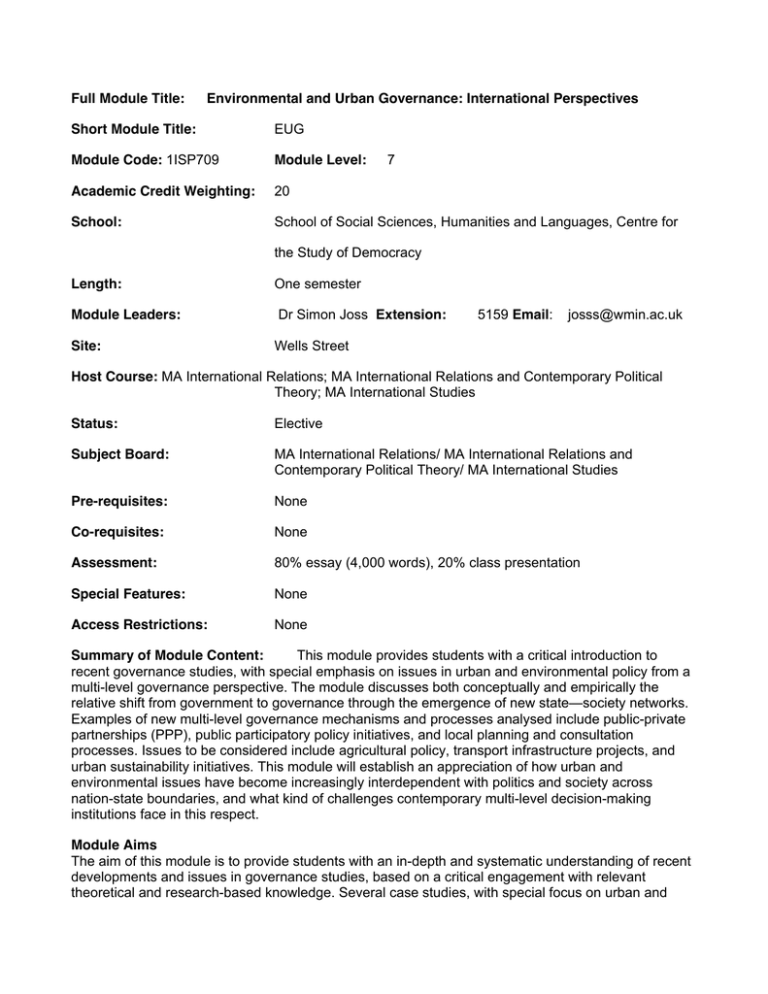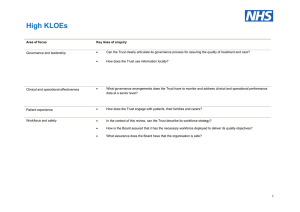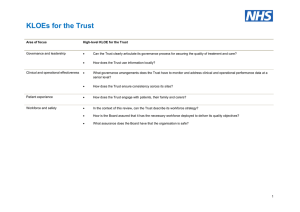Full Module Title: Environmental and Urban Governance: International Perspectives Short Module Title:
advertisement

Full Module Title: Environmental and Urban Governance: International Perspectives Short Module Title: EUG Module Code: 1ISP709 Module Level: Academic Credit Weighting: 20 School: School of Social Sciences, Humanities and Languages, Centre for 7 the Study of Democracy Length: One semester Module Leaders: Dr Simon Joss Extension: Site: Wells Street 5159 Email: josss@wmin.ac.uk Host Course: MA International Relations; MA International Relations and Contemporary Political Theory; MA International Studies Status: Elective Subject Board: MA International Relations/ MA International Relations and Contemporary Political Theory/ MA International Studies Pre-requisites: None Co-requisites: None Assessment: 80% essay (4,000 words), 20% class presentation Special Features: None Access Restrictions: None Summary of Module Content: This module provides students with a critical introduction to recent governance studies, with special emphasis on issues in urban and environmental policy from a multi-level governance perspective. The module discusses both conceptually and empirically the relative shift from government to governance through the emergence of new state—society networks. Examples of new multi-level governance mechanisms and processes analysed include public-private partnerships (PPP), public participatory policy initiatives, and local planning and consultation processes. Issues to be considered include agricultural policy, transport infrastructure projects, and urban sustainability initiatives. This module will establish an appreciation of how urban and environmental issues have become increasingly interdependent with politics and society across nation-state boundaries, and what kind of challenges contemporary multi-level decision-making institutions face in this respect. Module Aims The aim of this module is to provide students with an in-depth and systematic understanding of recent developments and issues in governance studies, based on a critical engagement with relevant theoretical and research-based knowledge. Several case studies, with special focus on urban and environmental issues (where the emergence of new multi-level governance processes have been particularly profound in recent years and decades), will be used to contextualise the theoretical knowledge gained, to critically analyse empirical research, and to develop a comprehensive understanding of methodological techniques, issues and perspectives regarding the study of contemporary governance. The module also aims to provide students with a critical understanding of how urban and environmental issues have become increasingly interdependent with politics and society, and what kind of challenges contemporary decision-making and its institutions face in this respect. Learning Outcomes By the end of this module, students will be able to: 1. demonstrate a systematic and critical understanding of issues and perspectives in multi-level governance studies, and how governance relates to representative decision-making at national and international levels; 2. demonstrate an in-depth, conceptual understanding of governance mechanisms and processes through the theoretical and empirical analysis of case studies focusing on urban and environmental issues in international context, and drawing on relevant theoretical and research literature 3. analyse and synthesise relevant knowledge, research and information for the purpose of developing critical conceptual and empirical perspectives on contemporary governance issues 4. show a critical, reflective understanding of how international relations, politics, public discourse and social developments interact with urban and environmental governance processes 5. demonstrate a comprehensive understanding of key methodological techniques approaches relevant to governance studies 6. undertake competently and relatively independently appropriate research tasks, using a full range of learning resources, working effectively in group settings, and managing relevant methodological techniques 7. demonstrate effective and autonomous presentation and communication skills. Indicative Syllabus Content The module syllabus content will include: 1. introduction to theories of multi-level governance: from ‘government’ to ‘governance’ 2. urban and environmental governance: issues and perspectives 3. methodological perspectives: how to research and analyse governance processes 4. public-private partnerships in national and international perspective 5. case study 1: the Copenhagen Metro and London Underground public-private partnership 6. participatory governance: British and European experiences 7. case study 2: the EU GM public debate 8. local planning and consultation 9. case study 3: the Grenoble-south-east London waste incinerators 10. transnational governance networks 11. case study 4: the European citizens’ discourse on brain science 12. future perspectives for multi-level governance Teaching and Learning Methods The main teaching and learning methods are based on staff-led introductory lectures and seminars, followed by student contributions. The latter will include active participation in seminar discussions, group work in case study discussions, and (written and oral) presentation of case study contributions in plenary sessions. Students will be expected to actively engage in all sessions Assessment Rationale The assessment by essay and class presentation has been chosen to reflect the MA level of the module. The essay requires students to demonstrate appropriate levels of competence and independence in planning, conducting and writing on a given topic, thus demonstrating a critical understanding and conceptual analysis of the materials introduced in the module based upon comprehensive reading and seminar discussions. The class presentation requires students to demonstrate appropriate levels of competence and independence in planning, conducting, summarizing and communicating a presentation in class, thus demonstrating a systematic and indepth engagement with selected and applied aspects of governance. This will also give students the opportunity develop and demonstrate their ability to present and communicate theoretical concepts and empirical research effectively to their peer community. Assessment criteria The essays should demonstrate that students have gained a systematic and critical understanding of the governance issue/perspective they are addressing, made themselves familiar with the appropriate literature, and demonstrated the ability to carry out a critical analysis of the various arguments used in the debate (learning outcomes 1-4). The class presentations should demonstrate that the students have achieved a comprehensive understanding of the specific issues/examples discussed and how these apply to theoretical governance perspectives, succeeded in evaluating the issue on the basis of primary and secondary sources of information and using appropriate methodological techniques, and managed to effectively summarise and present a piece of work within their peer community (learning outcomes 2, 5-7). In making oral presentations, tutors will consider: x The degree of knowledge and understanding of the subject matter; x The range of relevant literature used; x The appropriate use of empirical data; x The extent to which material has been synthesised x The clarity and coherence of the overall presentation; x The clarity of delivery (pace, audibility, etc.); x The extent to which time limits are observed; x The effectiveness with which oral questions are dealt with. In addition to the criteria listed above, the assessment of group presentations will also give credit for: x The degree of co-ordination among the members of the group; x The overall comprehensiveness of treatment of subject; x The clarity, suitability and quality of visual aids and handouts; x The quality of delivery; x Time-keeping. Assessment Method and Weighting 1 essay of 4,000 words; weighting 80% 1 class presentation; weighting 20% ____________________________________________________________________ Readings Essential Reading Commission of the European Communities (2001), European Governance. A White Paper. (Luxembourg: Office for Official Publications of the European Communities). Dahl, R. 1994. “A Democratic Dilemma. System Effectiveness versus Citizen Participation.” Political Science Quarterly, 10 (1): pp 23-34. Darrier, E. (ed). 1999. Discourses of the Environment, Oxford and Massachusetts: Blackwell Publishers. Fischer, F. 1990. Technocracy and The Politics of Expertise. Newbury Park/London/New Delhi: Sage Publications. Flinders, M. (2005), ‘The Politics of Public-Private Partnerships’, The British Journal of Politics and International Relations, 7 (2): 215-239. Grote, J.R, and Gbikpi, B. (2002), Participatory Governance. Political and Societal Implications (Opladen: Leske & Budrich). Hajer, M.A., and Wagenaar, H. (eds) (2003), Deliberative Policy Analysis: Understanding Governance in the Network Society (Cambridge: Cambridge University Press). Jordan, A., Wurzel, R. K. W., and Zito, A. (2005), ‘The Rise of „New“ Policy Instruments in Comparative Perspective: Has Governance Eclipsed Government?’, Political Studies, 53 (3), 477-496. Joss, S. (2005), ‘Between Policy and Politics; Or: whatever do weapons of mass destruction have to do with GM crops? The UK’s GM Nation Public Debate as an example of participatory governance’, in Democratization of Expertise? Exploring Novel Forms of Scientific Advice in Political Decision-Making (Maasen, S., and Weingart, P., eds) (Dordrecht: Springer): 171-187. Mohr, A. and Joss, S. 2003. The London Underground Public-Private Partnership Scheme. A Case Study. Research project report. London: Centre for the Study of Democracy. Parau, C. and Joss, S. 2003. The South-East London Combined Heat and Power Incinerator. A Case Study. Research project report. London: Centre for the Study of Democracy. Pierre, J., and Peters, B.G. (2000), Governance, Politics and the State (Basingstoke/ London: Macmillan Press). Further Reading Agriculture and Environment Biotechnology Commission (2001), Crops on Trial (http://www.aebc.gov.uk). Andersen, I-E., und Jæger, B. 1999. “Scenario workshops and consensus conferences: towards more democratic decision-making.” Science and Public Policy. 26 (5): pp 331340. Beck, U. 1992. Risk Society. Towards a New Modernity. London: Sage Publications. Bulletin of Science, Technology & Society. 2002. Special issue “Democratising Technology” (Hudspith, B., and Chopyak, J., Eds); Vol. 22 (nr 3, June 2002): pp 177-246. Department of the Environment, Transport and the Regions (2002), London Underground: Public Private Partnership – The Offer to Londoners (London: DETR). Department for Environment, Food and Rural Affairs (2002a), UK Government, Scottish Executive and Northern Ireland Department of the Environment Response to Crops on Trial Report (London: DEFRA). Department for Environment, Food and Rural Affairs (2002b), Public Dialogue on GM. UK Government Response to AEBC Advice Submitted in April 2002 (London: DEFRA). Department for Environment, Food and Rural Affairs (2003), The GM Dialogue: Government Response (London: DEFRA, 9 March 2003). De Schutter, O., Lebessis, N. and Paterson, J. (eds). 2001. Governance in the European Union. Brussels: European Commission (‘Cahiers’ of the Forward Studies Unit). Durant, J., Bauer, M.W., and Gaskell, G. 1998. Biotechnology in the Public Sphere. A European Sourcebook. London: Science Museum. ENDS (1999), ‘Government still struggling to master the biotechnology agenda’, ENDS Report, 292. European Commission. 2001 Towards A European Research Area. Brussels: European Commission. Flyvbjerg, B. 1998. Rationality and Power: Democracy in Practice. Chicago and London: the University of Chicago Press. Gaskell, G., Bauer, M.W., Allum, N., Lindsey, N., Durant, J., and Leuginger, J. 2001. “United Kingdom: spilling the beans on genes.” In Biotechnology 1996-2000. The Years of Controversy (Gaskell, G., and Bauer, M.W., eds). London: Science Museum. Hill, M. 1997. The Policy Process in the Modern State. New York/ London/ Toronto/ Sydney/ Tokyo and Singapore: Prentice Hall and Harvester/Weatsheaf: Chapter 5. Institute of Public Policy Research (2001), Building Better Partnerships: the final report from the Commission on Public Private Partnerships (London, IPPR). Irwin, A. 1995. Citizen Science. A Study of People, Expertise and Sustainable Development. London/New York: Routledge. Joss, S., and Bellucci, S. 2002. Participatory Technology Assessment. European Perspectives. London: Centre for the Study of Democracy. Kooiman (ed) (1993), Modern Governance. New Government – Society Interactions (London/ Thousand Oaks/ New Delhi: SAGE Publications). Mayer, I. 1997. Debating Technologies. A Methodological Contribution to the Design and Evaluation of Participatory Policy Analysis. Tilburg: Tilburg University Press. MORI (2000), London Attitudes to the Public Private Partnership for the Underground. Research Study Conducted for the Greater London Authority (London, MORI, November 2000). MORI (2001), Draft Transport Strategy: Public Opinion Poll. Summary Report. Research Study Conducted for Transport for London (London, MORI, June 2001). National Audit Office (2000), The Financial Analysis for the London Underground Public Private Partnerships. Report by the Comptroller and Auditor General, HC54 Session 2000-2001 (London, NAO, 15 December 2000). National Audit Office (2004a), London Underground. Are the Public Private Partnerships Likely to Work Successfully? Report by the Comptroller and Auditor General, HC644 Session 2003-2004 (London: NAO, 17 June 2004). National Audit Office (2004b), London Underground PPP: Were They Good Deals? Report by the Comptroller and Auditor General, HC645 Session 2003-2004 (London: NAO, 17 June 2004). OECD. 2001 Citizens As Partners – Information, Consultation and Public Participation in Policy-Making. Paris: Organisation for Economic Co-operation and Development. Rowell, A. 1996. Green Backlash: global subversion of the environment movement. London/ New York: Routledge. Schomberg, R., (Ed.). 1995. Contested Technology; Ethics, Risk and Public Debate Tilburg/Buenos Aires: International Centre For Human And Public Affairs. Science and Public Policy. October 1999. Special issue on public participation in science and technology. Vol. 26 (5): 289-380. Sclove, R. 1995. Democracy and Technology. New York/London: The Guildford Press. Steering Board. 2003. GM Nation? The Findings of The Public Debate. Report of the Steering Board of The Public Debate on GM (Genetic Modification) and GM Crops (http://www.gmnation.org.uk). The Industrial Society (2000), The London Underground Public Private Partnership: An Independent Review by the Industrial Society (London, The Industrial Society). The United Kingdom Parliament (2000), Funding of London Underground Select Committee on Environment, Transport and Regional Affairs, Fourteenth Report HC 411 (http://www.publications.parliament.uk/pa/cm199900/cmselect/cmenvtra/411/41105.htm , 2003). Transport for London (2000a), Outline of a Programme for the Rehabilitation and Management of the London Underground (http://www.londontransport.co.uk/tfl/pdfdocs/report 02.pdf, 2003). Transport for London (2000b), Report to Mayor Ken Livingstone regarding the Feasibility of the PPP Structure as Currently Proposed (http://www.london.gov.uk/approot/mayor/ppp/report01.pdf, 2003). Transport for London (2001a), Proposed Management Plan for the London Underground. Executive Summary (http://www.tfl.gov.uk/tfl/pdfdocs/ppp_excec_summ.pdf): 2. Transport for London (2001b), Report to Ken Livingstone on the London Underground’s proposed PPP (http://www.london.gov.uk/approot/mayor/strategies/transport/rtf/final_annx3.rtf): point 17. Weingart, P. 1999. “Scientific expertise and political accountability: paradoxes of science in politics.” Science and Public Policy, 26 (3): pp 151-161. Wynne, B. 1996. “May the sheep safely graze? A reflexive view of the expert-lay knowledge divide” Risk, Environment and Modernity; Towards a New Ecology (Lash, S, Szerszynski, B and Wynne, B, Eds). London: Sage Publications: pp 44-83.





